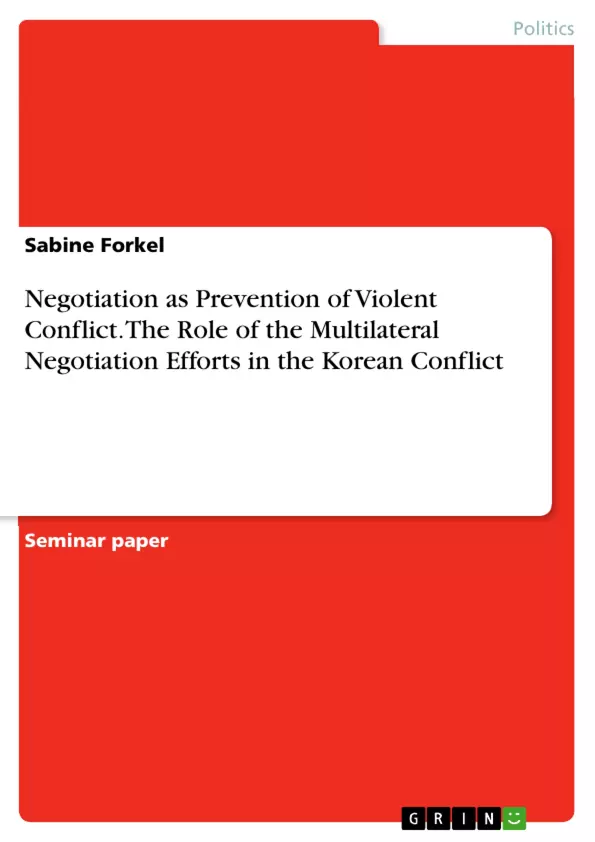After the nuclear weapons test in North Korea in 2006 it has become even more important to rethink the security policy concept of the whole region. The most important way to prevent an outbreak of the “cold war” to a “hot war” is to keep the negotiation process going on.
This paper is supposed to give an overview about the most important negotiation efforts of the involved countries and focuses the process and outcomes of the six-party talks. Within the negotiations very often the incorrect expectations about North Korea’s behaviour have made it harder to reach agreements with North Korea. On the other side North Korea’s negotiation strategy is still very non-transparent, changes regularly and does not provide many data about their policies, which makes it difficult to analyse its interests
Inhaltsverzeichnis (Table of Contents)
- 1. INTRODUCTION
- 2. HISTORICAL BACKGROUND
- 3. THE KOREAN CONFLICT
- 3.1 WHAT IS IT ABOUT?
- 3.1.1 The struggle about the absolute power.
- 3.1.2 North Korea's nuclear programme
- 3.2 MAIN CONFLICT PARTIES AND THEIR RELATIONS
- 3.2.1 North Korea, China and Russia
- 3.2.2 South Korea, USA and Japan
- 4. NEGOTIATION EFFORTS IN THE KOREAN CONFLICT
- 4.1 MEDIATION EFFORTS OF JIMMY CARTER AND THE AGREED FRAMEWORK
- 4.2 THE KOREAN PENINSULA ENERGY DEVELOPMENT ORGANIZATION (KEDO)
- 4.3 THE SIX-PARTY TALKS
- 4.3.1 The parties and their interests
- 4.3.2 Outcomes
- 4.3.3 North Korea's strategy within six-party talks.
- 5. RESULTS
- 6. REFERENTS
Zielsetzung und Themenschwerpunkte (Objectives and Key Themes)
This paper aims to provide an overview of the most important negotiation efforts in the Korean Conflict, focusing on the process and outcomes of the six-party talks. It examines the historical background of the conflict, analyzes the main points of conflict and the relations of the conflict parties, and explores the significance of multilateral negotiations, particularly the six-party talks, in preventing an escalation of the conflict.
- The historical background of the Korean Conflict
- The main points of conflict and the relations of the conflict parties
- The importance of multilateral negotiations in preventing an escalation of the conflict
- The process and outcomes of the six-party talks
- The role of North Korea's negotiation strategy in shaping the conflict
Zusammenfassung der Kapitel (Chapter Summaries)
The first chapter provides a brief introduction to the historical background of the Korean Conflict, tracing the relationship between Korea and Japan from the 1876 Treaty of 1876 to the 1910 Annexation Treaty. The chapter highlights the colonial exploitation of Korea by Japan and the subsequent rise of tensions between the two nations.
The second chapter delves into the main points of conflict, providing an overview of the relations between the conflict parties. It explores the strategic location of North Korea between China and the Soviet Union during the Cold War, and examines the formation of North and South Korea as separate states in 1948.
The third chapter examines the negotiation efforts in the Korean Conflict, focusing on the mediation efforts of Jimmy Carter and the Agreed Framework, the Korean Peninsula Energy Development Organization (KEDO), and the six-party talks. The chapter analyzes the parties involved in these negotiations, their interests, and the outcomes of these efforts.
Schlüsselwörter (Keywords)
The primary focus topics of this work include the Korean Conflict, multilateral negotiations, the six-party talks, North Korea's nuclear program, the relationship between North and South Korea, and the role of the United States, China, Russia, and Japan in the conflict.
- Quote paper
- Sabine Forkel (Author), 2014, Negotiation as Prevention of Violent Conflict. The Role of the Multilateral Negotiation Efforts in the Korean Conflict, Munich, GRIN Verlag, https://www.hausarbeiten.de/document/298225


